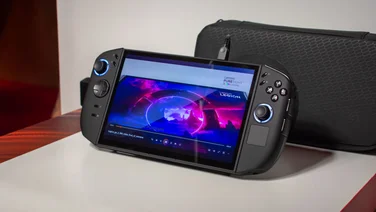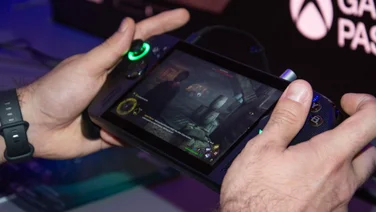To help us provide you with free impartial advice, we may earn a commission if you buy through links on our site. Learn more













- Great sound
- Excellent microphone
- Plug-and-play connection
- Mediocre battery life
- Many features are PC-exclusive
- Oil-attracting plastics
Corsair’s new HS80 RGB is aiming to be the do-it-all headset for cross-platform PC and PlayStation gamers.
Looking to build on Corsair’s success with the multiplatform HS70 and the Xbox-centric HS75, the HS80 uses a 2.4GHz receiver and Corsair’s low-latency Slipstream technology to offer plug-and-play wireless connectivity for PC, PS4 and PS5.
With cross-platform wireless play, a quality build, excellent audio chops and competitive levels of comfort, the HS80 looks as if it could tick a lot of boxes for dual PC and PlayStation gamers.
Corsair HS80 RGB review: What do you get for the money?
Pulling design cues from Corsair’s iconic Void Elite line, the HS80 is a slightly more mature affair, matte black from top to toe with LED lighting limited to subtle accents on the outer ear cups and microphone tip.
Construction is a mixture of premium-feel plastics with aluminium hinges and fit comes courtesy of an elasticated floating headband design. The headphones themselves are closed-back and built around a pair of 50mm neodymium drivers with fabric-covered memory foam ear pads.
Onboard there’s a physical power button, a volume wheel that can be tapped to toggle EQ settings and a USB-C port for charging or wired connection. The left cup also houses a non-removable microphone that conveniently mutes and changes colour while flipped up.
Wireless connectivity comes courtesy of a 2.4GHz USB-A receiver that utilises Corsair’s low-latency Slipstream tech. PC users can also plug in directly using the braided 2m USB-C to USB-A cable and gain access to 24-bit/96kHz audio. Dolby Atmos spatial surround sound is available for supported PC titles, and an Atmos Headphones licence is included with the headset.













Corsair’s companion iCue Windows application allows users to adjust the RGB lighting display, tweak microphone preferences and adjust EQ settings to taste.
Corsair HS80 RGB review: What do we like about it?
Connecting the HS80 is plug and play. The initial setup is essentially just waiting for some PC drivers to install, and on the PlayStation, it’s pretty much instant. Once the connection has been established, from then on it’s as simple as turning the headset on.













The ease of connection makes platform-hopping very straightforward; you simply need to move the USB receiver across and power up. For maximum convenience, I found myself leaving the wireless receiver connected to my PS4 and switching to the wired connection for PC play.
In-game, audio is top-notch, with clear and balanced playback and excellent separation. Soundscapes feel rich, voices carry clearly and audio remains mud-free even during the most hectic of firefights. If I was being critical I’d say that by default the bass is just a little lacklustre, but it can be easily remedied in the iCue software (on PC, at least).
The stereo soundstage is great and lends genuine space to onscreen environments. Atmos is also a welcome addition, adding an extra level of immersion to supported PC titles.













By plugging the HS80 into your PC directly you gain access to 24-bit/96kHz audio. I found wireless audio over Slipstream to be very competent and so didn’t necessarily notice a huge difference while tethered, but your mileage may vary, particularly if you have more sensitive ears.
The on-board high bandwidth microphone is a standout and offers excellent results with plenty of clarity, avoiding the muffled or overly compressed results often found with cheaper headsets. The mic will more than capably stand up to online gaming and should work well for streamers, too.
They’re also a very comfortable set of cans, with the floating headband working in concert with the soft memory foam pads to keep ear fatigue to a minimum. Opting for fabric-covered pads as opposed to faux leather does mean that a little more environmental sound bleeds through, but I found my ears remained cool and comfortable even over longer gaming sessions.
Corsair HS80 RGB review: What could be better?
The HS80’s biggest drawback is its middling battery life. Although advertised as offering up to 20 hours from a single charge, in reality, I think 12 hours is more realistic. I found I could usually get around a couple days of play out of it before the low battery beeps kicked in, and unfortunately recharge times aren’t exactly snappy either. While this isn’t necessarily a deal-breaker – it’s certainly more wireless playtime than I can get out of my comparatively lethargic PS4 controller – it’s a decidedly average performance for a headset at this price point.
It’s also worth underscoring that many of the HS80’s features, such as Dolby Atmos, EQ presets and RGB lighting controls, are PC-only and that tweaks made within the iCue app don’t carry over to console play. While this is pretty standard for console headsets it does mean you’ll really need to lean more towards PC play in order to get the most out of it.













Finally, some of the material choices are a little questionable. While it looks the business fresh out of the box, the lightly rubberised plastics on the outer ear cups and across the top of the headband are a real magnet for finger oils.
Corsair HS80 RGB review: Should you buy it?
The Corsair HS80 is a solid multi-platform wireless performer. Connectivity is truly plug and play, audio quality is great and the microphone is a real standout.
It’s a shame that its performance is tarnished slightly by mediocre battery performance, and if you can live without Atmos support, the Razer Barracuda X may offer slightly better value.
But overall, if you’re in the market for a premium multiplatform headset for PC and PlayStation play, the HS80 RGB should be top of your shortlist.







